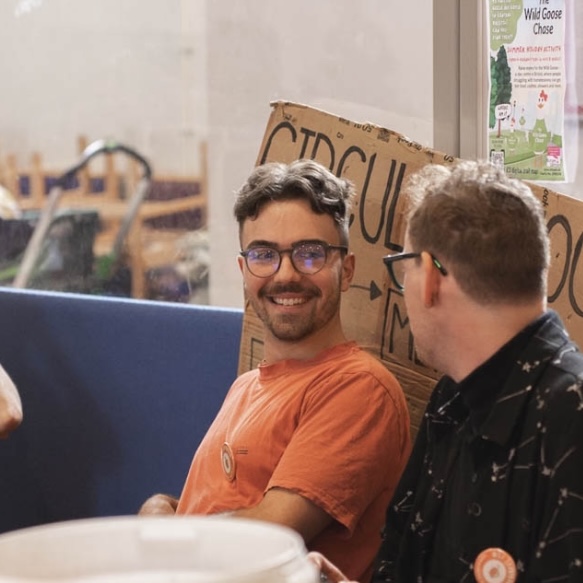What Is Bokashi? How Microbes Transform Food Waste into Soil
- Alex Montgomery
- Nov 20, 2024
- 4 min read
Updated: Dec 26, 2025
Bokashi composting is one of the most powerful and misunderstood tools in regenerative food systems. Originating in Japan, Bokashi uses fermentation and beneficial microbes to transform food waste into a nutrient-rich soil amendment.
Unlike traditional composting, Bokashi works with microbes rather than waiting for decomposition to happen. It’s fast, low-odour, and perfectly suited to urban life.
For cities like Bristol, where space is limited and food waste is abundant, Bokashi offers a missing link between kitchens, soil, and regeneration.

What Is Bokashi Composting?
Bokashi is a fermentation-based composting method that uses beneficial microorganisms to break down food waste in an anaerobic environment.
Instead of rotting, food scraps are pickled.
The word Bokashi roughly translates from Japanese as fermented organic matter. That distinction matters, because fermentation preserves nutrients rather than releasing them as gases.
Bokashi relies on effective microorganisms (EM), most commonly lactic acid bacteria, similar to those used to make sauerkraut, kimchi, yoghurt, and sourdough.
This is not waste disposal.
It’s microbial collaboration.
How Does Bokashi Work?
The Bokashi Bin
A Bokashi bin is airtight, creating the oxygen-free environment needed for fermentation. This is why Bokashi bins work so well indoors and don’t smell when used correctly.
(Think food fermentation, not decomposition.)
Layering Food Waste
Food scraps are added in layers, including things traditional compost systems struggle with:
Meat and fish
Dairy
Cooked food
Citrus
Bread
Each layer is sprinkled with Bokashi bran, which contains the microbes that drive fermentation.
Fermentation Phase
Once sealed, the bin is left for 1–2 weeks. During this time:
Odours are suppressed
Nutrients are stabilised
Pathogens are out-competed
Organic matter is pre-digested
The food waste looks mostly intact, but chemically and biologically, it has already changed.
Bokashi Liquid (Leachate)
During fermentation, a liquid drains from the bin. This Bokashi tea is rich in nutrients and microbes.
When diluted, it can be:
Used as a soil feed
Added to compost systems
Poured down drains to support microbial balance
Returning Bokashi to Soil
After fermentation, Bokashi material is buried in soil or added to an active compost system. Within 2–4 weeks, it fully integrates into the soil food web.
This is where Bokashi truly shines.
Fermentation prepares food waste for soil life.
Soil life finishes the job.
Why Bokashi Is Different from Traditional Composting
Bokashi isn’t better or worse than traditional composting. It’s different, and in many contexts, more appropriate.
Bokashi:
Accepts all food waste
Works quickly
Requires little space
Preserves nutrients
Supports microbial diversity
Traditional composting:
Requires outdoor space
Needs careful balancing
Can attract pests
Takes longer to mature
In dense urban environments, Bokashi removes the main barriers that stop people composting in the first place.

The Environmental Benefits of Bokashi Composting
Reducing Food Waste and Methane
Food waste in landfill breaks down anaerobically and releases methane, a greenhouse gas far more potent than carbon dioxide.
Bokashi diverts food waste before it becomes an emission problem.
This directly supports the principles outlined in The Food Waste Hierarchy: Turning Waste into Soil and Community
Supporting Soil Regeneration
Fermented organic matter feeds fungi, bacteria, protozoa, and nematodes, the organisms responsible for nutrient cycling and soil structure.
Healthy soil:
Holds more water
Stores more carbon
Grows more nutrient-dense food
This process underpins everything we do at Generation Soil, as explained in What Generation Soil Does: Turning Food Waste into Living Soil
Enabling Decentralised Composting
Bokashi works at household, school, and community scale. This makes it ideal for decentralised composting systems, where nutrients stay local instead of being exported out of the city.
This approach sits at the heart of What Is Circular Food? How Bristol Is Closing the Loop
Bokashi, Microbes, and Human Health
The microbes used in Bokashi aren’t just beneficial for soil. They reflect a much wider relationship between microbial exposure, environment, and wellbeing.
Spending time with living systems, soil, compost, plants, has measurable benefits for mental health and nervous system regulation.
This connection is explored further in The Unknown Impact of Soil Health on Wellbeing
Bokashi in Circular Food Systems
Bokashi composting plays a critical role in closing nutrient loops.
Food → soil → food → soil.
Instead of exporting food waste out of the city for processing, Bokashi allows nutrients to remain embedded in local food systems.
At Generation Soil, Bokashi is one of the tools we use within the Bristol Living Compost Project, where food waste becomes living compost used to grow food across the city.
How to Get Started with Bokashi
If you want to try Bokashi at home:
Get a sealed Bokashi bin
Source Bokashi bran
Add food waste in layers
Keep the bin airtight
Drain liquid regularly
Bury or compost the fermented material
If you’d rather skip the setup, we can do it for you.
Turning Bokashi into Living Compost with Generation Soil
If you’re based in Bristol, you can join our Food Waste Collection and Living Compost Service, where we use Bokashi fermentation as part of a wider regenerative composting system.
Members:
Have food waste collected
Avoid landfill entirely
Support local soil regeneration
Receive living compost or donate it to food-growing projects
Learn more or sign up via the Bristol Living Compost Project

Final Thoughts
Bokashi isn’t a gimmick.
It’s a reminder that waste is only waste when biology is excluded.
When microbes are invited back into the system, food scraps stop being a problem and start becoming a resource again.
Small bins.
Invisible organisms.
Big systemic change.
That’s Bokashi.




Comments